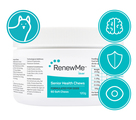“Ageing brain disorders, such as dementia and Alzheimer’s, are really hard to diagnose in dogs and cats. In veterinary we group all these conditions under the term 'cognitive dysfunction'. In simple terms, this is where the brain ages and doesn't function as well as it used to. We aren't exactly sure what causes this, but it is possibly due to brain cells naturally dying or small strokes in the brain itself.” - Dr. Nick Garside BVetMed MRCVS.
What are the signs?
Early signs of dog dementia can be subtle and progress gradually, meaning they’re not always enough to shock you into immediate action. Being familiar with the signs and spotting them early can help you be proactive in your pet’s care and initiate that first conversation with your vet.
The most notable indications of cognitive dysfunction are disorientation and memory loss, but it can be helpful to think in terms of ‘DISH’ which can be broken down more specifically into: Disorientation, Interaction (with family members), Sleep & Activity, and House Training.
Disorientation – includes pacing and/or aimless wandering, appearing lost in familiar surroundings, failing to recognise people and places, and reduced responsiveness to verbal commands and/or their name.
Interaction – your pet’s interactions with you and the home environment may also change, often not for the better. You may find they’re less enthusiastic and attention-seeking, showing indifference when you return home and not seeking the usual affections like belly rubs and play. Sometimes, cognitive dysfunction can even lead to displays of aggression and hostility.
Sleep & Activity – this one tends to get noticed first, as it can be the most disruptive and out of the norm. Pets with cognitive dysfunction tend to be restless at night, often sleeping more during the day and less after nightfall, with new and alarming vocalisations like barking and howling disturbing the household.
House Training – this includes urinating and defecating indoors (often just after they’ve been taken outside to toilet), and failing to indicate when they need to go.
How common is it?
It is believed that nearly one in three dogs over the age of 11 will display signs of cognitive dysfunction. For dogs over the age of 16, nearly all dogs will experience it to a degree.
If you’re wondering when your dog might be considered a ‘senior’, it will vary depending on their size. For small to medium dogs, they’re typically considered senior from approximately 7-9 years of age, while large and giant dogs reach this stage around the 6-7-year mark. Of course, this is just a guide and there will be variation between individuals.
What can be done?
While aging is inevitable and can’t, unfortunately, be slowed, the effects of ageing on your pet can be managed, helping them to enjoy their golden years as much as possible.
Supplements like RenewMe are formulated to help support healthy cells and neural connections in the brain, providing long-term assistance with memory and alertness. Its rich antioxidant complex can also help reduce oxidative damage and inflammation, supporting the overall health and function of the brain.
When it comes to cognitive dysfunction, there is no single – or simple – solution. Giving RenewMe in combination with environmental considerations, such as reducing stressful situations e.g. household noise levels, and increasing the frequency of toilet trips, can help counter and manage some of ageing’s more detrimental effects and bring a level of peace to your pet that it might not have experienced otherwise.
For more information on this, please don’t hesitate to get in touch and the team will gladly answer your questions. As always, if you are worried about your pet’s health or happiness, always consult your vet in the first instance.
Written by: Dr. Nick Garside BVetMed MRCVS





